June 1856 is an anniversary of note in the life of Hull General Cemetery. It was then that the Cemetery Company first received from the Hull Corporation an enquiry. This enquiry was about the possible purchase of the Cemetery by the Corporation. In essence the Corporation had been forced into this. Let me explain.
1848: The Year of Revolutions
The year 1848 had been important. The first attempt by the government to look at aspects of the nation’s public health was the Public Health Act passed that year. No longer would the concept of laissez-faire rule. Where the health of the public was involved the state would now take a hand. The Public Health Act was a culmination of the state’s intervention into what had been previously private matters. Edwin Chadwick’s report of 1842, ‘Report on the Sanitary Conditions of the Labouring Population of Great Britain’ could be seen as the starting point.
By the time of the 1848 Act, Parliament had passed Acts to enable local authorities to provide public washhouses and public baths. The Towns Improvement Clauses Act allowed local authorities to organise water supplies and sewage. It also allowed them to control ‘nuisances’ such as midden heaps that proliferated widely in the days of horses, cattle and pigs living in close confinement with humans.
What the Public Health Act did was to try to pull all of these changes together under one Act. It then set up a General Board of Health to oversee these changes. At the local level it allowed local authorities to set up a Local Board of Health. This set up continued well into the 20th century until the National Health Act of 1947 and in some cases even beyond that.
The Metropolis Act and its effects
The Cemetery Company were aware of these changes. They themselves had begun working in 1847. So the advent of the Public Health Act with its clauses related to the disposal of the dead was good news for the Company. By the time of the Metropolis Act of 1850, which forbade burials in a range of churchyards and chapels in London, the Company knew its future was secure. The Metropolis Act was rolled out over the country and by 1855 many of the burial grounds of Hull that were public nuisances were shut. As I’ve said elsewhere the Hull General Cemetery at this point in time was ‘the only game in town.’
This had long been recognised by the Hull Corporation. They knew that under the terms of the Metropolis Act they could compulsorily purchase the cemetery if they pursued that course via an Act of Parliament. This they attempted to do. It was known as the Kingston upon Hull Improvement Act. This Bill did not just focus on the cemetery. It was an all round bill, ranging from sewage to street lighting. But the cemetery, a going concern for the disposal of the dead, was firmly in its sights. This Act would allow the Corporation to take it over without the necessary bother of setting their own cemetery up. And they had the law on their side.
A tale in two Acts
The Company recognised this. The Board discussed this issue many times. Finally they acted. In October 1853 an advert in the Hull Daily News outlined what they were looking to do with their proposed Act.
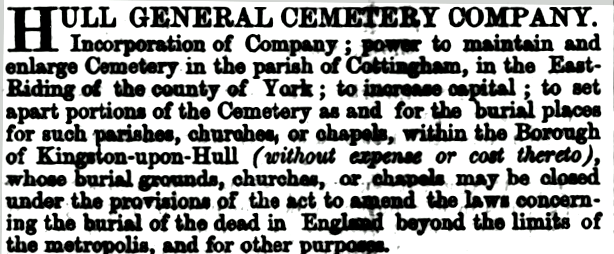
The Company drafted their own Act of Parliament. The main purpose was to move from a simple joint stock company to an incorporated one. It had learned from its neighbours in London. The local authorities, even under the Public Health Act and the Metropolis Act, could not take over cemeteries that had been created by their own Acts of Parliament. So Highgate, Kensal Green, Nunhead etc were saved from the reach of the municipal boroughs’ ownership.
Below is the Company’s Bill.
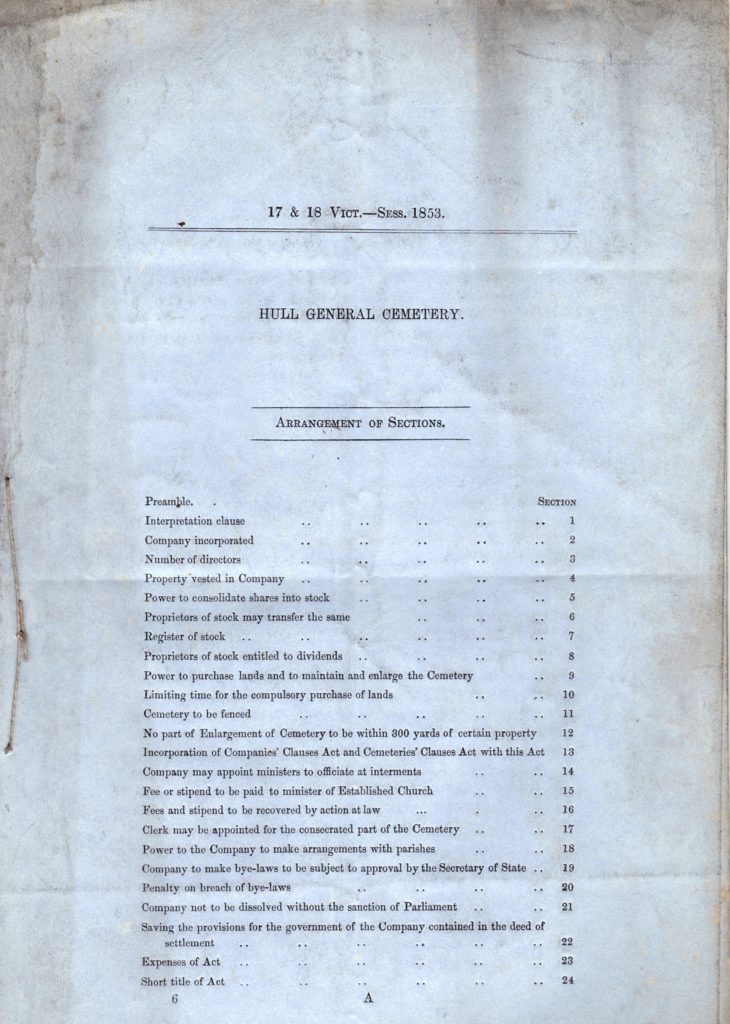
Both of these Bills, the Company’s one and the Hull Corporation one, travelled through Parliament at the same time in 1853. Many were the conversations about the lobbying of M.P.s that took place in the Company’s conversations in the board room. I’m equally sure that the same happened between the Councillors in the Town Hall.
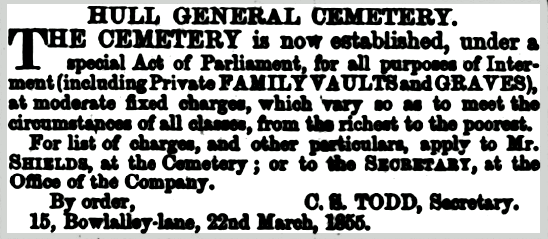
As the notice from the Hull Daily News of march 155 suggests, the Cemetery Bill was passed first. It was simpler and the readings would have been easier to negotiate than the more clause-laden one of the Corporations. With its passing the Company could breathe easier. Also as part of the Cemetery Bill it allowed the Cemetery Company to compulsorily purchase land to enlarge the cemetery. In essence the Company was looking forward to the future but also making the resale value of the cemetery a much more attractive proposition for the Company.
So, do you want a deal?
It’s here where our anniversary fits in. The Corporation, foiled in their attempt to capture the cemetery, now tried to negotiate with the Company. The Corporation had written to ask what price the Company would want if it wanted to sell or lease the cemetery to them. Their reaction is set out below. J.S. Thompson, the chair of the Company,
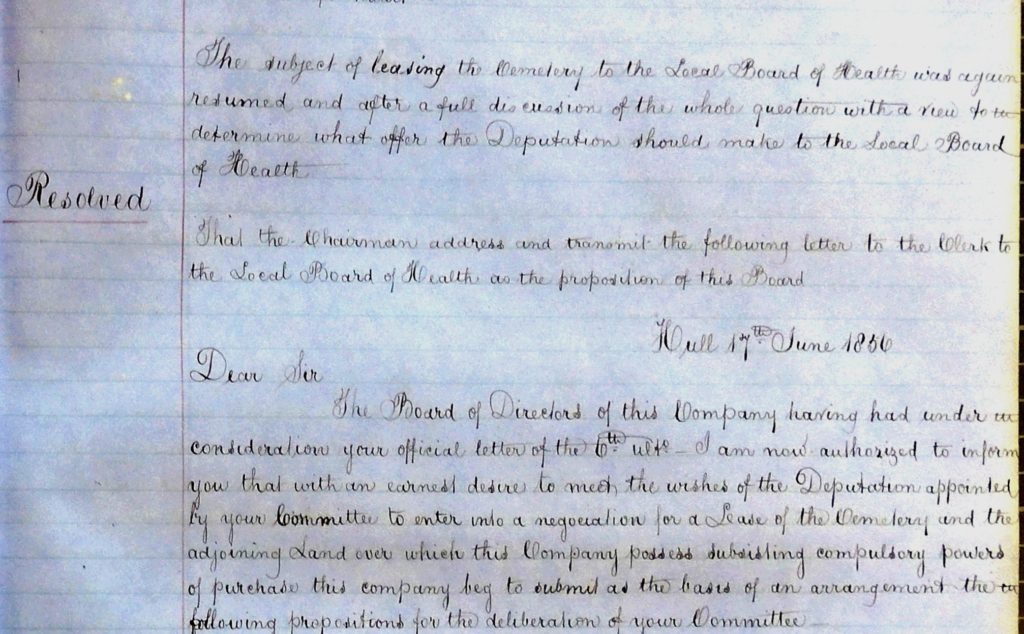
Thompson sets out in his first paragraph how attractive the cemetery is now as a going concern. An outright sale is not mentioned but a lease was something that the Company would consider. What is mentioned later is that for a sum of £17,000 the Corporation could take over the cemetery.
Overreach or just plain greed?
However the Cemetery Company still wanted to keep the workshops and ground where they conducted their stone masonry business from. They also insisted upon the Corporation giving them ‘preference’ when it came to erecting and supplying headstones and monuments to the public.
The Company had begun the cemetery with just £10,000 capital less than a decade earlier. Now after reaping the profits from burying the town’s dead for that same period, they now believed that the value of the cemetery had increased by 70%. And it wanted to maintain a lucrative side-line with the stone masonry part of its business.
This was the first and last time that the Cemetery Company held the whip hand over the Corporation. The Corporation would never forget this. The Company would rue this day many times in the future.
The Company must have known that it was pushing too hard. Points 9 and 10 of Mr Thompson’s letter offered a simpler solution to the Local Board of Health’s dilemma. It offered to lease its westernmost five acres to the Corporation. And with this action it sealed its own fate. But that’s another story.

Pete Lowden is a member of the Friends of Hull General Cemetery committee which is committed to reclaiming the cemetery and returning it back to a community resource.

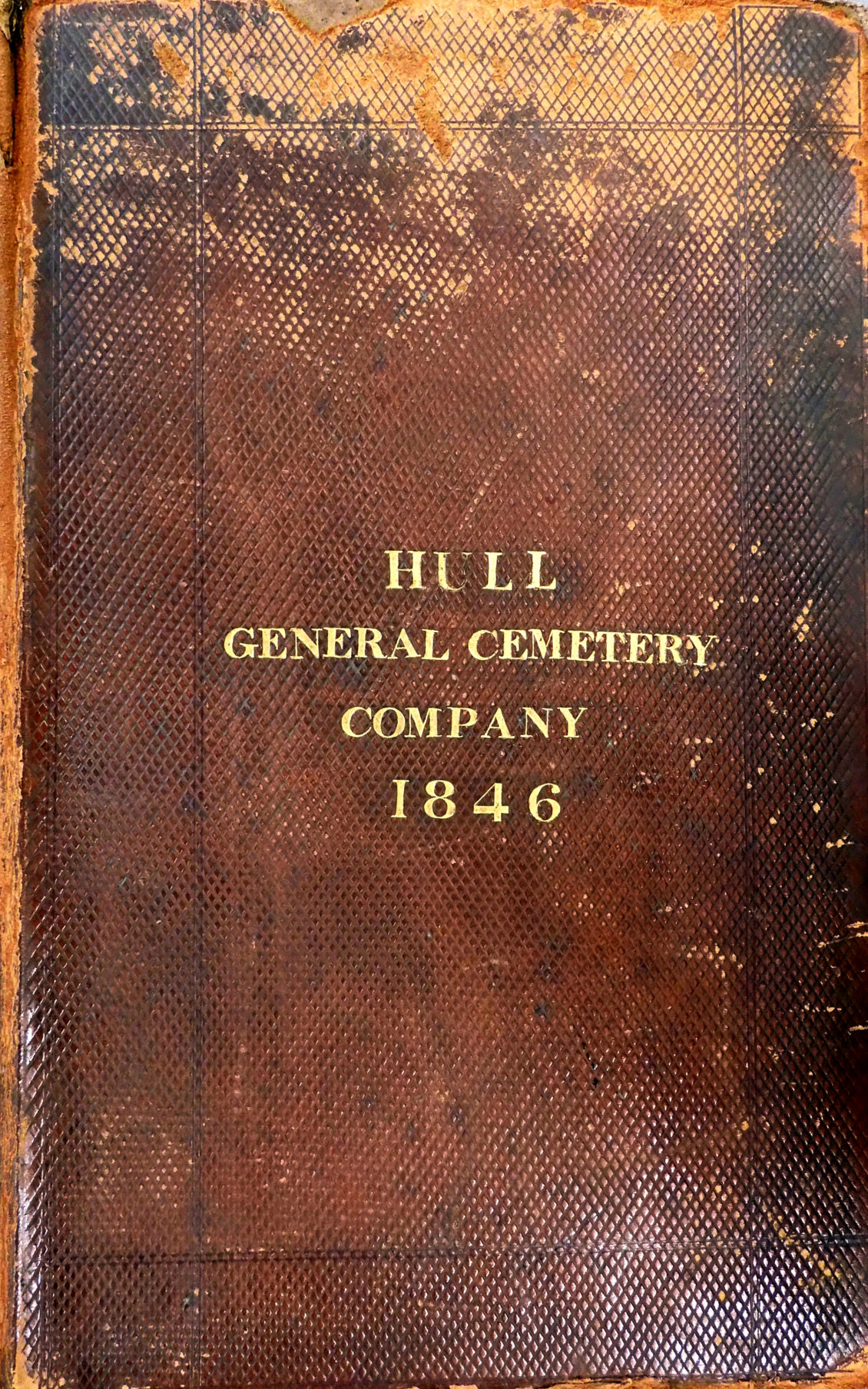
This was a very interesting read .Thank you. Regards,Geoff Lawes
Thank you Geoff. I’m glad you enjoyed it.
Yes, indeed interesting taken me some time to read this months articles but getting there.